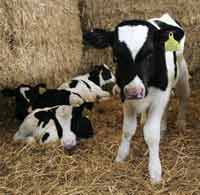Dairy Event 2010: Pneumonia in heifer calves costing more than £100 a head

Dairy heifer calves that contract pneumonia in the first three months of life can cost more than £100 a head from lost milk, according to research.
Speaking at the Dairy Event and Livestock Show, Pfizer vet Matt Williams explained how heifers calves contracting pneumonia in this period could have a reduced milk yield by 2.2% as well as an increased age at first calving by two weeks.
The yield loss is worth £39 a head on a 7000-litre first lactation at 25p/litre. In addition at £1.65 a day, two weeks of additional rearing time costs £23. And with the average cost of a case of pneumonia at £43 a calf, the total costs amount to more than £100 a calf, he said.
But as Mr Williams explained, despite the serious consequences of pneumonia, the infection can be a bit like an annoying, background noise. “It can be like a pump or noise fridge compressor – after a time you may stop noticing it unless it suddenly stops. Similarly when you put out feed or spread new bedding, you can get used to hearing a few animals coughing. Most of the time it may not sound serious, but it is the case that familiarity can breed acceptance.”
As a result, investigation in to the cause of coughing may be delayed until the respiratory infection has become more serious. “By this time more animals may have become infected and it can be more difficult to treat successfully.”
However, there are farms that rarely see respiratory problems and Mr Williams explained some key elements critical to minimising the risk. “Every new-born calf should receive at least three litres of colostrum, ideally from its own mother and in the first six hours from birth. Housing calves in low moisture, clean air and a non draught environment and minimising stress at weaning could also help.”
Other pointers to reducing threat of infection include correct nutrition and fresh water, vaccination against the three main viral instigators of respiratory disease – RSV, Pi3, IBR and the BVD virus, as well as a good stockman for observation of the early signs.
